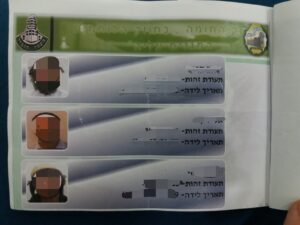Honenu has represented many citizens whose fundamental rights, including freedom of expression and freedom of protest, have been violated with regard to pride marches. Please click here for a list of relevant posts.
Monday, January 24, 2022, 12:02 In a compromise agreement between the two sides, the Israel Police will pay 6,000 NIS in compensation to Y., a Jewish youth who was falsely detained at the time of the 2020 Jerusalem Pride March. Y. came to Jerusalem with his fiancée to purchase a wedding ring and was detained for over seven hours at the police station without cause and without being interrogated. Honenu Attorney Menashe Yado, who is representing the youth, filed the suit. The statement of claim (summarized below) describes the detention:
As part of the preparations for their wedding, Y. and his fiancée arrived in Jerusalem from their respective places of residence for the purpose of purchasing a wedding ring. When they were on their way to buy a ring from a store in the center of the city, an unmarked car stopped near them. Plainclothes detectives who were in the car questioned the couple and took Y.’s personal details, including his ID number. Several minutes later, the car drove off. However, not long after, they returned and took Y. to the police station.
The reason for the detention was not clarified for several hours. Y. and his fiancée were not aware that the Jerusalem Pride March was being held that day, and their reasons for being in the city, as described above, were not connected to the march but rather to a personal matter of great importance to themselves. Despite that, Y. was detained for many hours. Even if the Israel Police were of the opinion that Y. was dangerous, a claim which requires proof, they should not have acted as they had.
If Y. had posed a danger to the Pride March, in a manner which justified distancing him from Jerusalem, then the Israel Police should have served him with a distancing order using the authority granted them by section 4(a) of the Police Ordinance. Being intrusive, such an order is subject to the accepted administrative procedures of a hearing and review by the High Court of Justice. On the other hand, if Y. had not been dangerous at a level which justified distancing him from Jerusalem at the time of the Pride March, then he should not have been detained only because he was in Jerusalem, which the police did, illegally.
For many years, Y. has been marked, for some reason, by the Israel Police as posing a danger to the Pride March, and every year before the march the police contact Y. with a request, a demand or a threat with regards to the Pride March. But they never serve him with a distancing order according to law. They only convey their message verbally. Moreover, after the 2017 Pride March, a pamphlet was found titled “Pride March Jerusalem Area 2017” and containing photographs and identifying details of “personas dangerous to the march”. Y., who is included in the pamphlet, was detained only because of his appearance and his being marked by the police, not because he had violated any law.
Honenu Attorney Menashe Yado responded to the agreement: “The Israel Police has made itself a law to round up religious men with long payot wearing tzitzit on the streets of a city at the time of the annual Pride March events. Every year we chase after the Israel Police to pay compensation after the fact to the falsely and unjustifiably detained. The police allow themselves to treat Jews in a way they never would with other sectors. It’s all right to be a Jew, but to act like it in the street constitutes a danger according to the police.”


